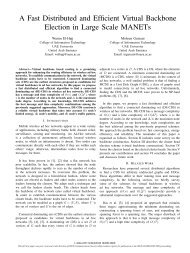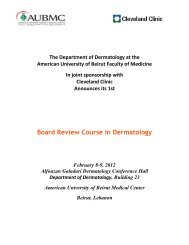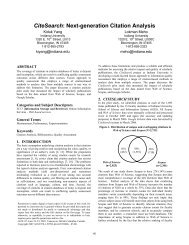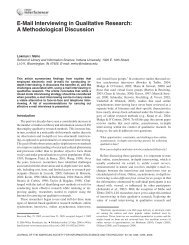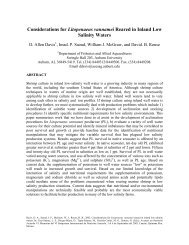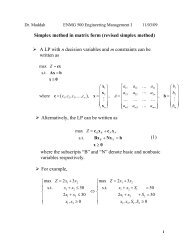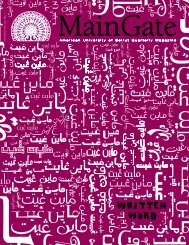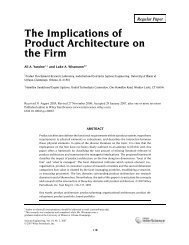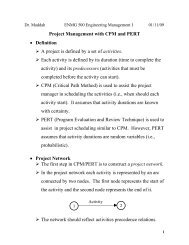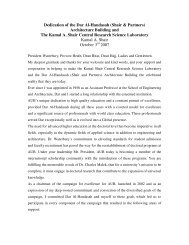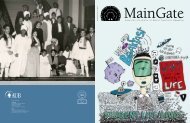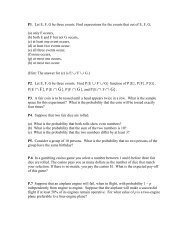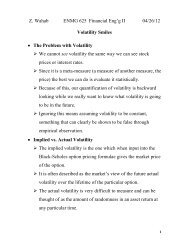Nahr el Bared Refugee Camp Crisis (Lebanon) - American ...
Nahr el Bared Refugee Camp Crisis (Lebanon) - American ...
Nahr el Bared Refugee Camp Crisis (Lebanon) - American ...
Create successful ePaper yourself
Turn your PDF publications into a flip-book with our unique Google optimized e-Paper software.
International Labour Organization (ILO). Moreover, the inflation in 2007 hit 16 percent,according to the Central Administration for Statistics. 5The rate of economic activity in Akkar is low compared to national rate. The reason is the ageformation of Akkar, the decrease of female economic activity and lack of work opportunities.(Nehma, 2007) In Akkar, the UNDP also observed the highest proportion of child labor in<strong>Lebanon</strong>, with 32.5% of the 10 to 19 year olds working. (World Bank, 2006)As we mentioned before, the impact of migration on social change is not very important.However, Anthropologist Maha Kayal (2008) has witnessed a reproduction of Minieh’s socialr<strong>el</strong>ationships in the diaspora. Many of the emigrants from Minieh return to it to get married to acousin living there. In fact, all the localities we deal with share traditional communities and areincreasingly influenced by some conservative political forces, including – sometimes – theSalafist Islamist movements. This can be partially explained the resistance of people in theseareas to accept reproductive health and family planning programs.There are indications that the economic downturn in Akkar and Tripoli has reinforced Islamistsentiments and growing support to such Sunni Islamist groups such as Jamaa al-Islamiyya. Thiscoincides with the fact that the lack of government services has increased the support foralternative forms of government (Haddad, 2002: 215). Many of people we interviewed expresseda fe<strong>el</strong>ing of sectarian discrimination, pointing out for instance the huge difference in roadinfrastructure between Batroun, Ehden and Zakharta from one side and Akkar from the otherside.In pre-war <strong>Lebanon</strong>, the most common way of accessing jobs and sevices was by joiningclient<strong>el</strong>istic networks controlled by an urban-based merchant <strong>el</strong>ite of political bosses (Ar. za‘im,pl. zu‘ama) (Johnson 1985, 1996). The civil war disrupted these networks and replaced zu‘amaclient<strong>el</strong>ism with a new and more complex mix of client<strong>el</strong>istic networks dev<strong>el</strong>oped aroundmilitias, parties and Islamist groups (Hamzeh 2001). The connection between client<strong>el</strong>ism andpoverty seem very important. (Knudsen, 2006) The presence of NGOs and institutions (political,r<strong>el</strong>igious, local, international-non r<strong>el</strong>igious) in Akkar area is very weak compared to other areain <strong>Lebanon</strong>. We find however some youth, sport and Women association 6 and very rareintermediary NGOs or international organizations. 7 Partnership between NGOs and municipalityis very loose.Economic SectorsThere are many economic sectors but the most important is agriculture, fishing and trade.5 See http://www.irinnews.org6 See for instance, Women W<strong>el</strong>fare Association in Behnine.7 With very few exceptions, like Mada, an enviromental NGO operating specifically in Akkararea since 2000. Their office in Akkar will be open very soon. Some NGOs are operating fromBeirut or Tripoli, like A Step Away (ASA)



